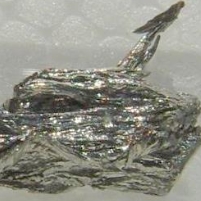U.S. Mining Company Hopes to Break Chinese Monopoly of Rare Minerals
Friday, April 23, 2010
 Thulium
Thulium
Molycorp Minerals wants to get back into rare earth minerals to challenge China, which now controls 97% of the market.. But reopening its open-pit mine in Mountain Pass, California, could be challenging economically due to the costs and because rare minerals, while in high demand, don’t produce big paydays. The mine, which dominated rare earth production into the 1980s, has been closed since 2002. The Chinese government tried to buy the mine in 2005, but was blocked by Congress.
In order to begin unearthing elements needed for green energy technologies, such as wind turbines and batteries for hybrid cars, or for iPods, air bag sensors, MRI machines and military weaponry, Molycorp will have to raise almost $500 million to reopen and expand its California mine. Compare that to the fact that global sales of rare minerals last year were only $1.4 billion. To compete with China, the American company will have to overcome the Asian giant’s low labor costs and willingness to pollute its local environment to better the bottom-line.
Among the rare earth minerals are:
- Bastnasite, used in polish products for mirrors, telescopes and hard drives, among others
- Cerium, which has various uses including in the manufacture of pollution-control systems in cars and oil refineries
- Lanthanum, used in fuel cells and batteries, could be an important element if electric cars become popular
- Neodymium, used in magnets that are critical in the making of cell phones, computers, sound systems, air bags and anti-lock brakes
- Gadolinium, used in MRI systems and in the detection of nuclear power plant radiation leaks
- Thulium, one of the rarest of rare earth elements, can be used to reduce X-ray exposure
-David Wallechinsky, Noel Brinkerhoff
Challenging China in Rare Earth Mining (by Keith Bradsher, New York Times)
China Controls Rare, but Important Minerals (by Noel Brinkerhoff, AllGov)
- Top Stories
- Unusual News
- Where is the Money Going?
- Controversies
- U.S. and the World
- Appointments and Resignations
- Latest News
- Trump to Stop Deportations If…
- Trump Denounces World Series
- What If China Invaded the United States?
- Donald Trump Has a Mental Health Problem and It Has a Name
- Trump Goes on Renaming Frenzy






Comments